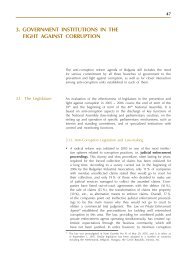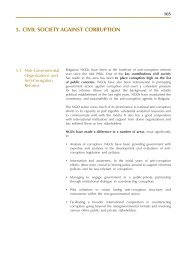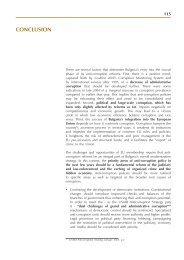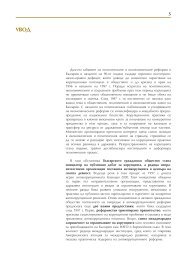National Threat Assessment 2008. Organised Crime - Politie
National Threat Assessment 2008. Organised Crime - Politie
National Threat Assessment 2008. Organised Crime - Politie
You also want an ePaper? Increase the reach of your titles
YUMPU automatically turns print PDFs into web optimized ePapers that Google loves.
The ‘handling of stolen goods link’ concerns intertwining the illegitimate<br />
with legitimate society. Garage and shipbroker businesses (for shipping abroad)<br />
are knowingly (or unknowingly) guilty of aiding and abetting.<br />
4.8.3 Scale<br />
Every year, between 2000 and 5000 handling offences are recorded by the<br />
police. The trend is upward, although the scale of property crime has been<br />
decreasing for years. If we compare the number of cases of handling offences<br />
with the number of thefts reported to the police, there is a sharp contrast.<br />
Around 800,000 thefts are recorded every year. Whilst it is plausible that by no<br />
means all of the stolen goods end up in Dutch handling circles, for example,<br />
because the thieves keep the goods for themselves or because they are sent<br />
abroad, it is still unlikely that only a tiny proportion of the stolen goods are sold<br />
off via handlers. We must conclude that relatively few handling offences are<br />
discovered by the police.<br />
Vehicles, electronic consumer items, money and clothing are easily the four most<br />
wanted items. As regards vehicles, we know that mainly new and expensive<br />
models are stolen; electronics equipment is often obtained from cargo theft,<br />
shoplifting or domestic burglaries and clothing is mostly obtained by shoplifting.<br />
4.8.4 Criminal organisation<br />
Relatively little is known about the handlers of stolen goods. Traditionally,<br />
handlers of stolen goods can be found among the residents of caravan camps.<br />
Handlers operate in a network of people and accomplices ensure that the sales<br />
channels are open. Sometimes one channel is used, sometimes another. The<br />
mechanisms that affect the choice of sales channel are not known; it probably<br />
all comes down to ‘who knows who’. The extent to which there is an actual<br />
criminal organisation in place is not known, but criminal organisations that are<br />
specialised in the handling of stolen goods have been identified. The leaders<br />
act as handlers. The case files paint a picture of risk-averse dealers. They take on<br />
anything that can generate a profit, but they do not go out stealing themselves.<br />
There have been cases where the handlers held sessions in cafés so that the<br />
group’s thieves could come to offer them their goods. The goods on offer varied<br />
and included cars, clothing, computers, electronic equipment, parcels, securities,<br />
generators, digital cameras, water scooters, jewellery and car parts such as<br />
on-board computers, airbags and radios. Some handlers act as coordinators<br />
for ‘stealing to order’. The frequency with which thieves are sent out with<br />
a ‘shopping list’ is not known.<br />
chapter 4 – Supraregional property crime<br />
177








